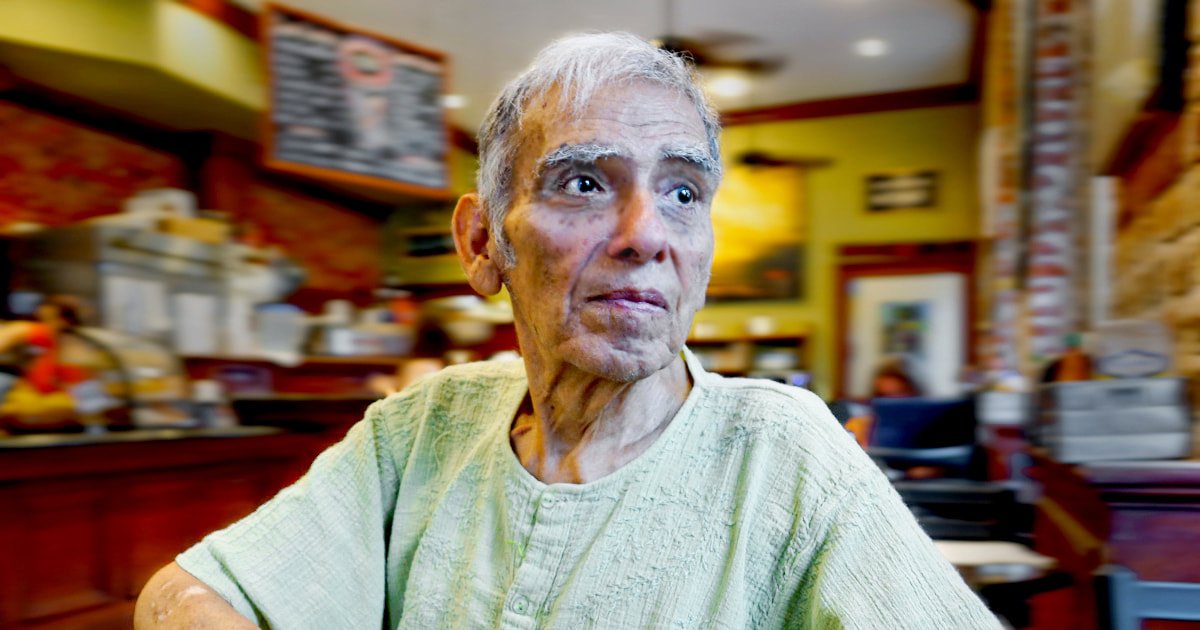Looking for Peace in New Orleans
One of the first Flea Market and Jazz Fest vendors, Cruz Sanchez still works in the Decatur Street store he founded fifty years ago - an island of calm in the midst of the French Quarter's whirl.
- story by Kirsten Reneau
- photos by Kirsten Reneau and Ellis Anderson and courtesy of Cruz Sanchez
Cruz Sanchez doesn’t have just a shop; he sells culture.
A customer paid him that “big compliment” a long time ago, Cruz says. His venerable store on the corner of Decatur Street and Barracks, called Kruz, catches the eye of tourists and locals alike. So does the man.
Cruz is difficult to ignore, even though he’s not making an effort to stand out. Age has brought him a slight hunch and a walker, but still he commands attention with a regal air and beatific smile.
When you step inside Kruz, the jazz riffs follow through the open doors, but the shop is a world apart from all others in this high-traffic, tourist-heavy area.
Cruz Sanchez taking an afternoon break in Café Envie on Decatur, just across the street from his shop.
Cruz is prone to calling his customers a family, which sounds trite until you see that he treats them as such. When he meets a new person, Cruz might ask the meaning behind the stranger’s first name, or about his family history. Then a patient Cruz pauses to allow the new customer to fully finish a sentence before he responds, giving the impression that he is not just waiting his turn to speak, but truly listening.
“Everybody that comes in is a friend,” he says. At least they are when they leave.
The shop primarily sells imports from India. The first thing that may catch your eye are long, gauzy outfits meant for belly dancing. Cruise himself was once a dancer, and his movements are still careful, fluid, holding onto training of days past. He is the son of two ballroom dancing partners turned husband and wife, and he spent his youth learning Mexican folk dancing before getting involved in ballroom and belly dancing.
“It’s DNA, I guess,” he says of the familial legacy.
Cruz's parents (top) and Cruz as a baby (below).
Around the flowing fabrics, figurines depicting Kali with her necklace of severed heads, Buddha and other gods and goddesses line the walls. Chain and metal masks sit on Styrofoam heads, vibrant tapestries with intricate mandalas are poised to unfold, and a section of wall is entirely devoted to incense in any smell you could imagine.
The shop is a busy place, but never overcrowded. Cruz sits in the back of the shop, calmly reading a book. Lately he’s been working on “The Art of Peace.”
“It’s honing my skills of being at peace with myself and the world,” he says.
Words and languages of the world were Cruz’s first passion. It was, in fact, languages that first lured Cruz to New Orleans. A native to Oklahoma, Cruz had to choose between Stanford and Tulane when he was looking at grad studies in linguistics.
“I had been here for Mardi Gras, and the city drew me back,” he says.
He loved New Orleans for the same reasons that many people do — home was a conservative place, and it was exciting to go to a place where gay bars were not hidden, where people could dance with others without fear of who was watching.
“I could be myself,” Cruz says.
The first Jazz Fest actually took place in 1970. This photo shows Cruz at the fest in the early 70s, after the festival moved to the fairgrounds.
Today Cruz is wearing bright orange shirt to bring awareness to gun safety. He read about the trending fashion choice online. He likes to stay on top of what’s going on in the world, even when it’s not peaceful.
While many things have changed since Cruz began working in the Quarter, he points to technology as the most dramatically altered arena. The original shop opened in 1972 - the same year the video game Pong was introduced, the handheld calculator was first sold, and shop rent in the Quarter was $75.
Kruz has only changed locations once, switching to a spot catty-cornered from his old Decatur Street address five years ago. The shop's roots are far different than the existing incarnation. The business started in a 10-person craft guild at a flea market run by community organizer Michael Stark, a man that was dedicated to giving the hippie subculture of its time a place to grow and thrive . The market included potters, a crochet artist, a leathersmith and Cruz, who made clothing like kaftans and robes while enrolled in graduate school.
“In the French Quarter, at first, everyone was aware of each other but had no real sense of community because most everyone was new. There was no shared history together,” he says. “But with enough time, we developed a community.”
Eventually the flea market disbanded as vendors began opening their own shops, including Cruz, who soon found success. His regular flea market customers followed him to his shop. Fellow artists from the guild made attempts to open their own stores as well but mostly failed.
“After a couple of months they thought, ‘There’s no money here,’ and they left. But I stayed and it became what Kruz is now. That was the beginning.”
Sanchez and his younger sister, Dee, who came to help after his stroke seven years ago, are the only two employees now.
“This morning I drove through the French Quarter, and I was amazed at how much has changed — but it also looks the same as it did many years ago,” he observes. “It’s less neighborhood-y. We had a few tourists back then, but nothing like it is now. It was kind of a quiet area, but it buzzed up.”
He’s one of the last of his kind, a T-Rex of Quarter commerce, and he knows that. Cruz laments that most of the businesses he once knew are gone. But while he’s quick to admit the area has gotten more “touristy” since he opened the shop 50 years ago, he doesn’t resent the transformation.
“I noticed everything looked like a tourist circus,” he says of his morning drive. “But I’m glad. This is where the money is - and all the action.”
Cruz freely admits there’s a personal reason he likes having visitors float in and out of his shop from the chaos of the Quarter surrounding him. He is a self-described linguaphile who grew up speaking Spanish first, then learned English and eventually went on to study French, Arabic, Japanese, Swahili and Italian.
“One day I was walking the street, and I saw a Japanese couple. I spoke to them in Japanese. They responded, and I was so excited that they understood me that I walked away and didn’t say another word,” he says, laughing.
Once he had made the decision to stay in the city, Cruz can recall only one time that he considered closing up shop and moving away. After Hurricane Katrina hit, he, like many others, evacuated and intended to stay gone for good. He went back to Oklahoma.
Oklahoma, after all, was safe. It was his first home. It made sense. But it wasn’t where he found peace, not in the way he needed it.
“One day while I was in Oklahoma City, I went to a movie. I came out and it was a beautiful fall day, and I felt so sad. I missed New Orleans.
“At that moment, I decided to come back. I’ve been here ever since. I guess I’ll be buried here.”
Help support our creative team –become a member of our Readers’ Circle now!













